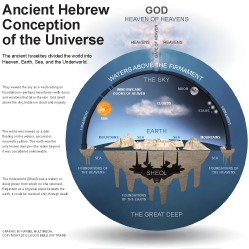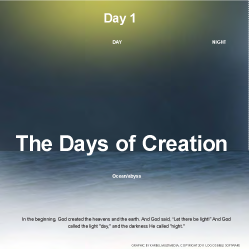136:1–26 In this corporate praise psalm (meant for use in group settings), the psalmist rehearses Israel’s sacred history, focusing on the events of the exodus and entry into the promised land. The psalmist begins by calling his audience to praise God for His goodness and His power over all that exists (vv. 1–3), and he emphasizes God’s work in creating the cosmos (vv. 4–9). He then focuses on God’s relationship with Israel, describing how He delivered Israel from slavery |
 Types of Psalms Table
Types of Psalms Table
136:1–3 After an initial statement of thanksgiving for God’s goodness, the psalmist exhorts his audience to give thanks to Israel’s God as the supreme God and Lord over all creation (see Deut 10:17). |
136:1 The second half of Ps 136:1 is repeated verbatim throughout the psalm. |
Give thanks to Yahweh While thanksgiving and praise are closely related in the Psalms, thanksgiving is usually connected to something God has done, while praise is based on God’s excellence and character.
loyal love The Hebrew word used here, chesed—which refers to God’s covenantal love (see note on 25:10)—is rooted in His commitment to Israel that developed in a series of promises given to Israel’s great leaders.
 Chesed Word Study
Chesed Word Study
endures forever The Hebrew expression used here, le'olam, conveys the unceasing nature of God’s commitment over the course of Israel’s history.
136:2 the God of gods The Hebrew phrase used here, elohe ha'elohim, communicates God’s supremacy over foreign deities. Compare 82:1 and note; 82:2 and note.
136:3 the Lord of lords The Hebrew phrase used here, adone haadonim, is probably meant to communicate God’s power over the human sphere, especially when paralleled with elohe ha'elohim (see note on v. 2), which emphasizes God’s power over the spiritual realm.
136:4–9 The psalmist focuses on God’s activity in creation. The creation of heavens, earth, and the celestial bodies all point to God’s insight, skill, and power. |
136:4 great wonders The Hebrew word used here, niphla'oth, is most commonly associated with the events of the exodus (see Exod 7:3).
136:5 him who made the heavens with skill The word tevunah (“cleverness” or “skill”) reflects Proverbs 8:22.
136:6 him who spread out the earth above the waters This reflects ancient Near Eastern cosmology, which understood the earth as a platform sitting upon waters and supported by pillars.
136:7 the great lights Refers to the sun and moon (see Gen 1:16).
136:8–9 The depiction of the sun and moon ruling over the day and night (respectively) reflects the creation account of Gen 1. Both instances use the Hebrew word mashal, which means to rule or exercise dominion (see Gen 1:18). |
136:10–16 In his depiction of the exodus, the psalmist highlights the most spectacular of God’s mighty works—the final plague of the death of the firstborn of Egypt (Exod 12:29–32) and the crossing of the Red Sea (Exod 14–15). |
136:10 him who struck Egypt through their firstborn The 10th plague against Egypt (see Exod 12:29–32).
136:11 he brought Israel out from among them Old Testament writers frequently use this expression to refer to the exodus from Egypt (see Exod 20:2).
136:12 a strong hand and an outstretched arm Old Testament writers frequently use this phrase to describe God’s action in the exodus (see Deut 4:34).
136:13 him who divided the Red Sea in two See Exod 14:21.
136:14 he let Israel cross over through the midst of it See Exod 14:22.
136:15 he tossed Pharaoh and his army See Exod 14:23–28.
136:16 him who led his people through the wilderness The events of Israel’s wilderness journey begin after crossing the Red Sea (Exod 15:22) and continue through the book of Numbers.
begin after crossing the Red Sea (Exod 15:22) and continue through the book of Numbers.
136:17–22 Like Ps 135:10–12, these verses depict the defeat of the Amorites as a decisive event in God’s provision for Israel. Verses 21–22 depicts Israel’s entry into Canaan as an act of power and a transfer of ownership, calling Canaan a heritage given to Israel. |
136:17 him who struck great kings Although the psalmist specifically mentions Sihon and Og (vv. 19–20), he may have all of the events of the conquest of Canaan in mind (see vv. 21–22). The book of Joshua recounts the story of Israel’s conquest of Canaan under Joshua’s leadership.
136:19 Sihon the king of the Amorites One of the first enemies defeated after the wilderness wanderings (Num 21:21–30).
136:20 Og the king of Bashan One of the first enemies defeated after the wilderness wanderings (Num 21:33–35).
136:21 he gave their land as an inheritance See Ps 135:12 and note.
136:23–26 In this closing section, the psalmist reiterates the major emphases of the other sections of the psalm, but not in the order he originally presented them. Verse 23 seems to refer to the Israelites’ time in Egypt, while v. 24 seems to refer to their victory over the Amorites. In v. 25, the psalmist discusses God’s provision of food, which is likely an echo of the creation theme of vv. 4–9. The use of the Hebrew phrase el hashamayim (meaning “God of heaven”; v. 26) echoes the introduction of the psalm, especially v. 2. |
136:23 Who remembered us in our low estate This probably refers to Israel’s enslavement in Egypt (see Exod 3:7).
136:26 Give thanks to the God of heaven This echoes Ps 136:1–3 and encapsulates the other titles given to Yahweh there. As the ruler of heaven, he is ultimately sovereign over everything else.

|
About Faithlife Study BibleFaithlife Study Bible (FSB) is your guide to the ancient world of the Old and New Testaments, with study notes and articles that draw from a wide range of academic research. FSB helps you learn how to think about interpretation methods and issues so that you can gain a deeper understanding of the text. |
| Copyright |
Copyright 2012 Logos Bible Software. |
| Support Info | fsb |
 Loading…
Loading…


